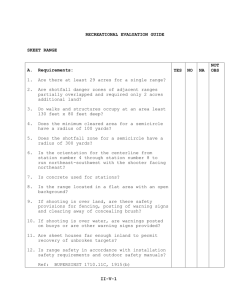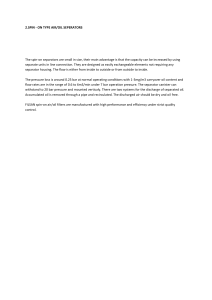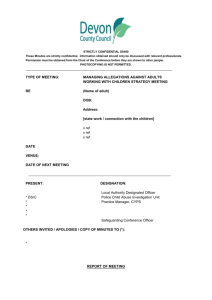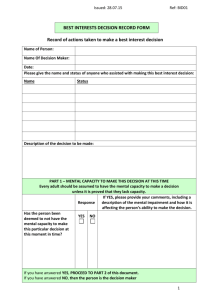Test Bank for DK Guide to Public Speaking, Lisa A. Ford
advertisement
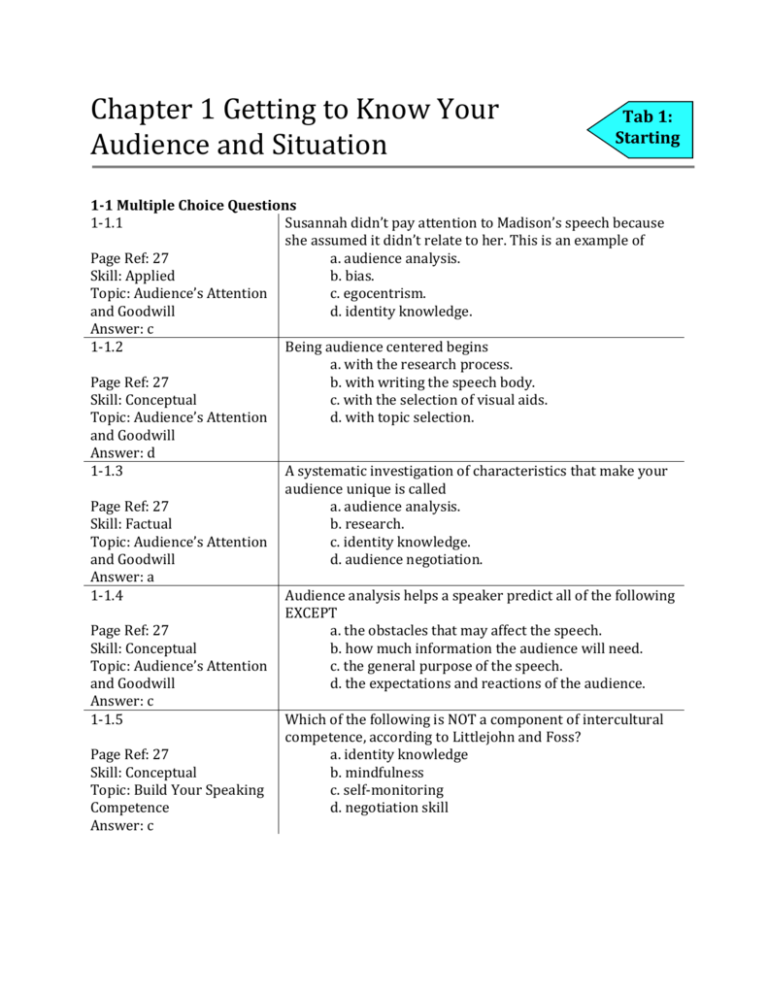
Chapter 1 Getting to Know Your Audience and Situation Tab 1: Starting 1-1 Multiple Choice Questions 1-1.1 Susannah didn’t pay attention to Madison’s speech because she assumed it didn’t relate to her. This is an example of Page Ref: 27 a. audience analysis. Skill: Applied b. bias. Topic: Audience’s Attention c. egocentrism. and Goodwill d. identity knowledge. Answer: c 1-1.2 Being audience centered begins a. with the research process. Page Ref: 27 b. with writing the speech body. Skill: Conceptual c. with the selection of visual aids. Topic: Audience’s Attention d. with topic selection. and Goodwill Answer: d 1-1.3 A systematic investigation of characteristics that make your audience unique is called Page Ref: 27 a. audience analysis. Skill: Factual b. research. Topic: Audience’s Attention c. identity knowledge. and Goodwill d. audience negotiation. Answer: a 1-1.4 Audience analysis helps a speaker predict all of the following EXCEPT Page Ref: 27 a. the obstacles that may affect the speech. Skill: Conceptual b. how much information the audience will need. Topic: Audience’s Attention c. the general purpose of the speech. and Goodwill d. the expectations and reactions of the audience. Answer: c 1-1.5 Which of the following is NOT a component of intercultural competence, according to Littlejohn and Foss? Page Ref: 27 a. identity knowledge Skill: Conceptual b. mindfulness Topic: Build Your Speaking c. self-monitoring Competence d. negotiation skill Answer: c 1-1.6 Page Ref: 27 Skill: Factual Topic: Build Your Speaking Competence Answer: a 1-1.7 Page Ref:27 Skill: Applied Topic: Build Your Speaking Competence Answer: b 1-1.8 Page Ref: 29 Skill: Factual Topic: Beliefs Answer: d 1-1.9 Page Ref: 29 Skill: Applied Topic: Beliefs Answer: a 1-1.10 Page Ref: 29 Skill: Factual Topic: Values Answer: b 1-1.11 Page Ref: 29 Skill: Applied Topic: Values Answer: c 1-1.12 Page Ref: 28 Skill: Conceptual Topic: Attitudes Answer: d 1-1.13 Knowing what is distinctive about an audience is called a. identity knowledge. b. mindfulness. c. egocentrism. d. negotiation skill. Juan paid attention to the characteristics of his audience members and took care to keep them in mind during the whole speech-making process. This is an example of a. negotiation skill. b. mindfulness. c. selective attention. d. identity knowledge. Those things a person accepts as plausible based on interpretation and judgment are called a. values. b. attitudes. c. policies. d. beliefs. “Smoking marijuana leads to the use of other drugs.” This is an example of a(n) a. belief. b. value. c. attitude. d. policy. _____ relate to what a person sees as right or wrong, important or unimportant, desirable or undesirable. a. Beliefs b. Values c. Attitudes d. Opinions Ben’s family places a lot of importance on gaining a quality education. This is an example of a(n) a. belief. b. opinion c. value. d. attitude. Inclinations to feel either positive or negative toward something are called a. values. b. beliefs. c. policies. d. attitudes. “I love classic rock!” This is an example of a(n) Page Ref: 28 Skill: Applied Topic: Attitudes Answer: b 1-1.14 Page Ref: 29 Skill: Conceptual Topic: Beliefs, Values, Attitudes Answer: d 1-1.15 Page Ref: 30 Skill: Conceptual Topic: Personal Traits Answer: a 1-1.16 Page Ref: 30 Skill: Applied Topic: Personal Traits Answer: d 1-1.17 Page Ref: 30 Skill: Applied Topic: Personal Traits Answer: c 1-1.18 Page Ref: 31 Skill: Conceptual Topic: Personal Traits Answer: d 1-1.19 Page Ref: 31 Skill: Conceptual Topic: Personal Traits Answer: b 1-1.20 a. value. b. attitude. c. belief. d. policy. An audience’s _____ is made up of values, attitudes, and beliefs. a. personality b. demographic c. profile d. identity Demographics can also be called a. personal traits. b. social traits. c. cultural traits. d. psychological traits. Which of the following is NOT a personal trait? a. income b. disabilities c. household type d. beliefs Shalonda noted that most of her audience members were employed in the medical field. This is an example of paying attention to a. psychological traits. b. social traits. c. personal traits. d. cultural traits. _____ occurs when you apply a false or oversimplified generalization to an individual based on group characteristics. a. Audience analysis b. Demographic analysis c. Egocentrism d. Stereotyping Which of the following words best defines traditionalists? a. optimistic b. loyal c. skepticism d. realistic Which of the following is NOT a characteristic of those born Page Ref: 31 Skill: Conceptual Topic: Personal Traits Answer: a 1-1.21 Page Ref: 31 Skill: Factual Topic: Personal Traits Answer: b 1-1.22 Page Ref: 31 Skill: Conceptual Topic: Personal Traits Answer: d 1-1.23 Page Ref: 31 Skill: Factual Topic: Personal Traits Answer: a 1-1.24 Page Ref: 32 Skill: Conceptual Topic: Psychological Traits Answer: c 1-1.25 Page Ref: 32 Skill: Conceptual Topic: Psychological Traits Answer: b 1-1.26 Page Ref: 32 Skill: Conceptual Topic: Psychological Traits Answer: a before 1945? a. very competitive b. conservative c. respect for authority d. little formal education People who were born between 1946 and 1964 are called a. millennials. b. baby boomers. c. generation X. d. traditionalists. Which of the following is NOT a characteristic of Generation Y? a. techno-savvy b. confident c. appreciate diversity d. spend rather than save According to the Population Reference Bureau, _____ percent of U.S. households in 2002 were “traditional.” a. 7 b. 17 c. 37 d. 57 The needs and motivations of your audience are called _____ traits. a. personal b. social c. psychological d. physiological Which of the following is FALSE in regard to Maslow’s hierarchy of needs? a. It is best represented as a pyramid. b. The most basic needs are at the top of the model. c. Basic needs must be fulfilled before higher needs. d. It explains that our needs motivate us to respond in certain ways. According to Maslow, our most basic needs are a. physiological. b. safety. c. psychological. d. social. 1-1.27 Page Ref: 32 Skill: Applied Topic: Psychological Traits Answer: b 1-1.28 Page Ref: 32 Skill: Factual Topic: Psychological Traits Answer: c 1-1.29 Page Ref: 33 Skill: Factual Topic: Social Traits Answer: d 1-1.30 Page Ref: 33 Skill: Conceptual Topic: Social Traits Answer: a 1-1.31 Page Ref: 35 Skill: Factual Topic: Social Traits Answer: a 1-1.32 Page Ref: 35 Skill: Conceptual Topic: Social Traits Answer: c 1-1.33 Page Ref: 39 Skill: Factual Topic: Occasion Answer: b A speech on the importance of a having a fire escape plan for the home evokes which need? a. physiological b. safety c. social d. self-esteem Our need to feel a part of groups and to be close to others is termed _____ needs. a. physiological b. safety c. social d. self-actualization The _____ traits of your audience relate to how they are affected by or identify with other groups of people. a. psychological b. physiological c. personal d. social Which of the following is NOT a component of race? a. nation of birth b. color and texture of hair c. color of skin and eyes d. shape of facial features _____ cultures will have clearly defined divisions of authority and responsibility. a. High-power b. Low-power c. Individual d. Collective Which of the following is NOT a characteristic of the United States? a. It is a low-power culture. b. It is competitive culture. c. It is a long-term country. d. It is an individual country. An audience who is required to attend is called a. hostile. b. captive. c. voluntary. d. mandatory. 1-1.34 Page Ref: 41 Skill: Applied Topic: Interview Answer: b 1-1.35 Page Ref: 42 Skill: Conceptual Topic: Survey Answer: a 1-1.36 Page Ref: 45 Skill: Applied Topic: External Noise Answer: d 1-1.37 Page Ref: 45 Skill: Applied Topic: Internal Noise Answer: b 1-1.38 Page Ref: 45 Skill: Applied Topic: External Noise Answer: b 1-1.39 Page Ref: 45 Skill: Conceptual Topic: Internal Noise Answer: c 1-1.40 Which of the following is an open-ended question? a. Is this your first semester in college? b. Why did you choose to attend college here? c. Are you an organ donor? d. How old are you? Which of the following is NOT a guideline for constructing an effective survey? a. use more open-ended questions than closed-ended question b. make no assumptions about your respondents c. avoid biased or leading questions d. use a clean, consistent structure for the overall questionnaire Which of the following is an environmental barrier? a. being distracted by thoughts of a previous conversation b. getting confused by the jargon in a speech c. getting distracted by the facial expressions of the speaker d. having difficulty hearing the speaker due to people talking nearby Miguel had a headache and had trouble focusing on the speeches in class. This is an example of a(n) a. psychological barrier. b. physiological barrier. c. linguistic barrier. d. environmental barrier. Which of the following is NOT a type of external noise? a. being too hot in the classroom b. thinking about the speech you are about to give c. not understanding the slang terms in the speech d. getting distracted by the speaker’s pacing back and forth Which of the following is NOT a tip for adapting to internal noise? a. pay attention to the nonverbal behavior of your audience b. be a creative, dynamic speaker so your audience will want to listen to you c. pay attention to the noises affecting you and your audience d. anticipate a potentially negative response and lessen the effect After surveying his fellow students about the new residence Page Ref: 47 Skill: Conceptual Topic: Surveying the Audience Answer: b 1-2 True/False Questions 1-2.1 Page Ref: 25 Skill: Conceptual Topic: Knowing your Audience Answer: False 1-2.2 Page Ref: 27 Skill: Factual Topic: Building Speaking Competence Answer: True 1-2.3 Page Ref: 28 Skill: Applied Topic: Beliefs Answer: False 1-2.4 Page Ref: 30 Skill: Conceptual Topic: Personal Traits Answer: True 1-2.5 Page Ref: 31 Skill: Conceptual Topic: Personal Traits Answer: False hall to be built at the college, Chang decided to a. write a speech persuading his classmates that the hall is a good idea despite the increase in fees. b. write a speech explaining how the college plans to help students cope with the fee increases. c. change his speech topic due to a lack of interest. d. write a speech on alternate off-campus housing options. Connecting to an audience will come easily for a good speaker. Being able to respond to an audience differences through sensitivity, politeness, willing adjustment, and collaboration is known as negotiation skill. “Having too much salt in the diet can lead to high blood pressure.” This is an example of an attitude. Sexual orientation, occupation, and household type are all considered personal traits. Baby boomers are more likely to save rather than spend money. 1-2.6 Page Ref: 32 Skill: Conceptual Topic: Psychological Traits Answer: False 1-2.7 Page Ref: 33 Skill: Conceptual Topic: Social Traits Answer: False 1-2.8 Page Ref: 34 Skill: Factual Topic: Social Traits Answer: True 1-2.9 Page Ref: 35 Skill: Factual Topic: Social Traits Answer: True 1-2.10 Page Ref: 35 Skill: Conceptual Topic: Social Traits Answer: True 1-2.11 Page Ref: 40 Skill: Conceptual Topic: Stop, Think, and Brainstorm Answer: False 1-2.12 Page Ref: 42 Skill: Conceptual Topic: Survey Answer: False According to Maslow, the highest level of needs we have is that of self-esteem. All social traits are designated by choice. It is predicted that by the year 2050, white Americans will be in the minority. Low-uncertainty cultures are tolerant of the unusual, new ideas, and other people. The United States is considered to be competitive and individual. The first step in audience analysis should be to ask friends, relatives, peers, and others about their insights into your speech topic. Good surveys should have a majority of open-ended questions. 1-2.13 Page Ref: 42 Skill: Applied Topic: Survey Answer: True 1-2.14 Page Ref: 44 Skill: Conceptual Topic: Adapting to Your Audience During Your Speech Answer: False 1-2.15 Page Ref: 45 Skill: Applied Topic: External Noise Answer: False “Do you plan to vote in the next election?” This is an example of a closed-ended question. Good speakers will conduct all of their audience analysis before the speech is given. Lauren had a difficult time listening to the professor because the temperature in the room was too cold. This is an example of a physiological barrier. 1-3 Completion (fill-in-the-blank) Questions 1-3.1 An audience member’s tendency to think “what’s in it for me” while listening to a speech is termed _____. Page Ref: 27 Skill: Conceptual Topic: Getting Your Audience’s Attention and Goodwill Answer: egocentrism 1-3.2 According to Littlejohn and Foss, identity knowledge, mindfulness, and negotiation skill all make up _____. Page Ref: 27 Skill: Conceptual Topic: Building Speaking Competence Answer: speaking competence 1-3.4 Page Ref: 27 Skill: Conceptual Topic: Building Speaking Competence Answer: Mindfulness 1-3.5 Page Ref: 29 Skill: Applied Topic: Values Answer: value 1-3.6 Page Ref: 30 Skill: Conceptual Topic: Personal Traits Answer: Personal traits 1-3.7 Page Ref: 31 Skill: Conceptual Topic: Personal Traits Answer: Stereotyping 1-3.8 Page Ref: 31 Skill: Conceptual Topic: Personal Traits Answer: millennials/generation Y 1-3.9 Page Ref: 32 Skill: Conceptual Topic: Psychological Traits Answer: Self-esteem 1-3.10 Page Ref: 33 Skill: Conceptual Topic: Social Traits Answer: Culture 1-3.11 _____ is known as constantly paying attention to the differences among your audience members. “It is important to take care of one’s health.” This is an example of a(n) _____. _____ include characteristics such as age, sexual orientation, and education. _____ can happen if you focus too much on trends when analyzing your audience. Audience members who are good with technology, appreciate diversity, and who are influenced by the media are called _____. _____ needs include a need for success, prestige, and selfrespect. ______ is a system that helps teach us rules for being accepted and surviving in a community. A(n) _____ audience will be motivated by a speech that Page Ref: 35 Skill: Conceptual Topic: Social Traits Answer: short-term 1-3.12 Page Ref: 41 Skill: Conceptual Topic: Interview, Survey Answer: Open-ended 1-3.13 Page Ref: 45 Skill: Conceptual Topic: External Noise Answer: Linguistic 1-3.14 Page Ref: 45 Skill: Applied Topic: Internal Noise Answer: physiological 1-3.15 emphasizes instant gratification. _____ questions allow for detailed responses in your interviews and surveys. _____ barriers can include a speaker’s use of slang, jargon as well as misread body language. Jason had a difficult time focusing on Jacki’s speech because he was hungry and tired. He was affected by _____ barriers. _____ includes both environmental and linguistic barriers. Page Ref: 45 Skill: Conceptual Topic: External Noise Answer: External noise 1-4 Short Answer Questions 1-4.1 What can be predicted by using audience analysis? (List three out of five.) Page Ref: 27 Skill: Conceptual Topic: Getting Your Audiences Attention and Good Will Answer: What ideas you could stress for your audience; How much information they will need; What language and support material will work best for them; Their potential expectations and reactions; What obstacles might affect your speech. 1-4.2 What does it mean for a speaker to be mindful? Page Ref: 27 Skill: Conceptual Topic: Building Your Speaking Competence Answer: Paying attention to the distinctions in the audience during the entire speaking process. 1-4.3 What are the three elements that make up speaking competence? Page Ref: 27 Skill: Conceptual Topic: Building Your Speaking Competence Answer: Identity knowledge, mindfulness, and negotiation skill. 1-4.4 Page Ref: p. 28–29 Skill: Applied Topic: Beliefs, Values, Attitudes Answer: Answers will vary. 1-4.5 Page Ref: 31 Skill: Applied Topic: Personal Traits Answer: Answers will vary. 1-4.6 Give an example of a belief, a value, and an attitude that you hold, making sure to label each one. What generation do you belong to and what characteristics are attributed to this group? Imagine you are going to give a speech about the problem of credit card debt to an audience of traditionalists and baby boomers. How might these two groups differ on their reaction to your topic? Page Ref: 31 Skill: Applied Topic: Personal Traits Answer: Baby boomers tend to spend rather than save, while traditionalists are more likely to value saving. 1-4.7 What does Maslow’s hierarchy of needs attempt to explain? Page Ref: 32 Skill: Conceptual Topic: Psychological Traits Answer: It shows how people are motivated by their needs, with the lowest needs having to be met before moving up to higher needs. 1-4.8 Page Ref: 32 Skill: Applied Topic: Psychological Traits Answer: Answers will vary. 1-4.9 Give examples of speech topics that would attempt to tap into the need for (1) safety, (2) social needs, and (3) selfesteem. Explain the differences between the terms race, ethnicity, and culture. Page Ref: 33 Skill: Conceptual Topic: Social Traits Answer: Race refers to biological differences. Ethnicity relates to religious or national affiliations while culture is the system that teaches us the rules to follow to be accepted and survive within a community. 1-4.10 How do long-term and short-term audiences differ? Page Ref: 35 Skill: Conceptual Topic: Social Traits Answer: Long-term audiences look for future benefits and respond to detail and persistence. Short-term audiences look for almost instant gratification. 1-4.11 Is the United States an individual or collective culture? Explain your answer. Page Ref: 35 Skill: Conceptual Topic: Social Traits Answer: The U.S. is an individual culture because we place emphasis on the self instead of on the group. 1-4.12 List three questions regarding situational time you should ask before giving a speech? Page Ref: 39 Skill: Conceptual Topic: Time Answer: What is my time limit? How early should I arrive? What is the timing of my speech? Where do I fall in the rotation of speakers? Is there late-breaking news? Is this my first time speaking in front of this audience? What is my relationship to this audience? 1-4.13 List three questions regarding situational occasion you should ask before giving a speech? Page Ref: 39 Skill: Conceptual Topic: Occasion Answer: What does the audience expect? What is the mood? Why are they here? How will they respond to the topic? Is this a special occasion? What are the social norms and expectations? Who’s in charge and what is their relationship with the audience? 1-4.14 According to Chapter 1 of your book, what are the options for gathering information about your audience? Page Ref: 40–44 Skill: Conceptual Topic: Locating Audience and Situation Information Answer: Start with what you know. Ask others about the audience. Conduct interviews. Create and administer a survey. Research the group to which you are speaking. 1-4.15 Page Ref: 45 Skill: Applied Topic: Internal Noise Answer: Answers will vary. Give an example of a psychological barrier you have faced while trying to listen to a speaker. 1-5 Essay Questions 1-5.1 Page Ref: 30–35 Skill: Applied Topic: Personal, Psychological, Social Traits After reading the following survey on the topic of the Gulf Oil Spill, correct any questions that you feel are ineffective and explain why you made the corrections. 1. Have you ever vacationed in the Gulf area? _____ Yes _____ No 2. Do you agree that the Federal Government is not doing enough to stop the flow of oil? ____ Yes _____ No 3. What should BP be doing differently to contain the spill? 4. Who do you feel is the most responsible for the spill and why? 5. How serious do you think the Gulf Oil Spill is and do you think it will affect our nation’s long-term energy policy? Grading Criteria: A complete answer will note that the second question is leading in nature, there are too many open-ended questions for a short survey and the fifth question has two questions contained in one. 1-5.2 Identify and discuss the four generations that are explained in Chapter 1 of your book. How can you be sensitive to the differences between these groups without falling into the trap of stereotyping? Page Ref: 31 Skill: Conceptual Topic: Personal Traits Answer: Traditionalists marry once, believe in saving, are conservative, respect authority and America, and are not easily persuaded. Baby boomers are more educated and political, spend rather than save, divorce and remarry, are cynical and challenge authority. Generation X are products of divorce, resourceful, independent, struggle with money, and are influenced by the media. Millennials are smart, confident, techno-savvy, concerned with personal safety, influenced by friends and media, appreciate diversity, and can be biased. Stereotyping can be avoided by using these differences only as a guide. 1-5.3 Draw and label a diagram of Maslow’s hierarchy of needs then explain each level. Page Ref: 32 Skill: Conceptual Topic: Psychological Traits Grading Rubric: Label each section of pyramid: 10% each (total of 50%); Explain each level: 10% each (total of 50%) 1-5.4 The United States is going to get even more diverse in the coming years. Explain how a speaker should view this diversity in order to be effective. Page Ref: 34 Skill: Conceptual Topic: Social Traits Grading Rubric: Explanation of population change: 50%; Explanation of how speakers can meet the challenge: 50%. 1-5.5 Through audience analysis, you learn that your audience has the following characteristics: High power, collectivist, and long-term. Knowing these characteristics, how would you adapt your speech to meet the audience’s needs? Page Ref: 35 Skill: Conceptual Topic: Cultural Tendencies Answer: High-power audiences will be impressed by support material from credible sources so I need to be sure to include oral citations from sources my audience will respect. If my audience is collectivist then I should be sure to appeal to their sense of being part of a community and a sense of duty to the group. Finally, since they are a long-term audience, I know that they are not looking for instant gratification so I can offer future goals for the audience that will be available through their persistence.

